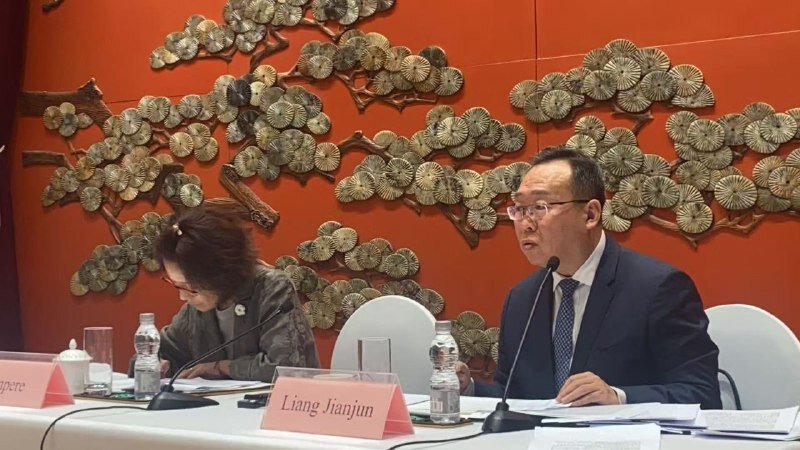China's neighborhood diplomacy: A key to global security and prosperity

BEIJING – China's steadfast commitment to multilateralism and the vision of a community with a shared future for humanity was prominently reaffirmed during a meeting organized by the China Public Diplomacy Association (CPDA) in Beijing on Tuesday.
The event, held at the Xianhe Hall of the Beijing International Club, attracted numerous international and domestic journalists and focused on "China’s philosophy and practice of neighborhood diplomacy in the New Era."
Liang Jianjun, Deputy Director General of the Department of Asian Affairs at the Chinese Foreign Ministry, delivered a thought-provoking speech.
He stressed that China attaches considerable significance to promoting ties with its neighbors.
"Neighboring countries are an important component for China's development and prosperity, a key to safeguarding international security, and a top priority in the overall planning of China's global diplomacy. They are also key to promoting the building of a community with a shared future for mankind," the senior Foreign Ministry official said.
China promotes vision of shared future for humanity
Liang’s comments highlighted the Central Conference on Work Relating to Neighboring Countries held in Beijing from April 8 to 9. The conference emphasized that China will uphold the "principles of amity, sincerity, mutual benefit, and inclusivity" to strengthen strategic trust with neighboring nations and jointly build a "five-home" vision of "peace, stability, prosperity, beauty, and friendship."
Addressing the conference, President Xi Jinping emphasized creating a community with a shared future with China’s neighboring countries. This commitment was further reinforced during his three-nation tour to Vietnam, Malaysia, and Cambodia last month, where he reiterated the significance of collaboration and mutual development in the region.
Xi has also stressed that "China will work with other countries to build a community with a shared future for mankind, forge partnerships across the world, enhance friendship and cooperation, and explore a new path of growing state-to-state relations based on mutual respect, fairness, justice, and win-win cooperation."
Global South gains stronger voice through BRICS and BRI
Following his speech, Liang addressed questions from reporters. As an Iranian journalist and representative of the Tehran Times, I was among the foreign media who had the opportunity to question the senior Foreign Ministry official. I inquired about the concrete steps China has taken to enhance the representation and decision-making power of developing countries in global governance institutions.
Liang doubled down on President Xi’s call for building a multi-polar world.
"President Xi said we should build an equitable and orderly multi-polar world, which means that countries, big or small, are equal. It should not be a 'winner takes all' scenario or follow the jungle law where the strong suppress the weak. Instead, we should have equal opportunities and responsibilities, and everyone should find their place in the multi-polar system. That's why we have been calling for multilateralism and upholding international fairness and justice," he said.
Liang noted that BRICS and the Belt and Road Initiative (BRI) are among the mechanisms that have helped developing countries raise their voices on the global stage.
"The Global South is experiencing a collective rise, bringing profound changes to the global landscape. It has become an important force driving global transformation. Of course, we are a member of the Global South, and we attach great importance to cooperation with other members. We aim to enhance the voice and representation of other Global South members in global forums and international organizations."
He added, "BRICS has amplified the voice of developing countries on key topics like climate change, trade, etc. After China proposed the BRI, over 150 countries and international organizations have implemented over 3,100 projects, with a total value exceeding $1 trillion. This has also provided new insights and ideas for promoting global development."
Liang further warned that "the multi-polar world is facing some headwinds due to some countries’ unreasonable acts," calling for upholding the authority of the United Nations.
He condemned unilateral measures and trade confrontations, emphasizing China's openness to resolving disputes through dialogue while firmly safeguarding its legitimate rights.
President Donald Trump initiated a trade war with China after returning to the White House in January, imposing heavy tariffs on Chinese exports to the US. China responded with retaliatory tariffs on US imports. China’s firm position, coupled with the adverse impacts of US tariffs on American consumers and farmers, has recently led to a de-escalation of the trade war.
China’s multilateral vision vs. America’s unilateral tendencies
Fundamentally, Liang’s remarks crystallize China’s diplomatic philosophy, reaffirming its commitment to a fairer global order. China positions itself as a champion of inclusive multilateralism, advocating for equal participation in international affairs regardless of national size or influence. This approach is demonstrated through its active role in UN frameworks upholding international law, its promotion of balanced trade systems and climate policies sensitive to developing nations’ needs, and its Belt and Road Initiative fostering shared development through infrastructure and cultural ties.
This stands in contrast to America’s unilateral tendencies, where Washington has historically prioritized strategic interests over institutional consensus, employed unsanctioned economic measures and military actions, and bypassed multilateral mechanisms when constrained by them.
China presents its model as offering an alternative paradigm centered on collective security and mutual development rather than zero-sum competition.
